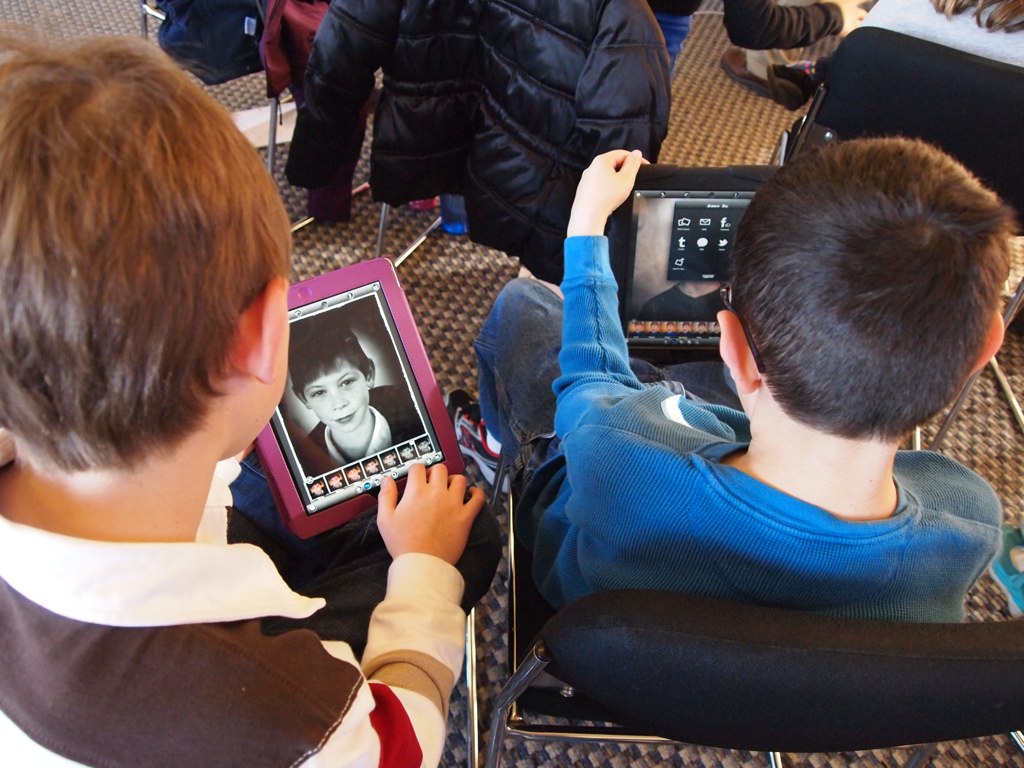This article is produced in partnership with The 74.
Young children who spend more than 75 minutes on a tablet were more likely to show increased outbursts of anger and frustration, a new study has found.
A lead researcher on the study said when preschoolers spend time on tablets at 3 ½ years of age, they show increased outbursts of anger by age 4 ½, which then leads to increased time on computer tablets at age 5 ½.
Researchers described the trend as a “vicious cycle,” where excessive tablet use delays children’s ability to deal with their emotions, leading them to use screen time to soothe themselves when they’re upset.
“The preschool years are a very important time for learning how to cope with negative emotions [like frustration and anger],” said Gabrielle Garon-Carrier, an assistant professor of psychoeducation at the University of Sherbrooke in Quebec. “Learning to recognize emotions and adopt behaviors that are acceptable to society cannot be done in front of tablets.”
The study was published last month in JAMA Pediatrics.
Previous research has linked the use of mobile devices to emotional dysregulation in children, Garon-Carrier said, but few studies have been able to show a direct link between tablet use and a cycle that could interfere with the development of self-regulation skills.
Preschoolers learn to use time in front of a screen to cope with frustration or other challenging emotions, Garon-Carrier said, rather than how to manage those feelings.
Student researchers visited the homes of 315 families with preschool-aged children in Nova Scotia, Canada three times — when children were 3 ½ in 2020 and again in 2021 and 2022.
Parents were asked how much time children spent using a tablet and also about emotional behaviors; along with how the child handled transitions at bath or bedtime.
Researchers found that children whose tablet use increased by 75 minutes when they were 3 ½ were 22 percent more angry or frustrated at other points of the day by the age of 4 ½, according to the study. A year later, the same children were using the tablet about 17 minutes more per day.
The study followed the same children over three years, from 2020 to 2022, as part of a bigger research project into other aspects of family life such as sleep and physical activity, Garon-Carrier said.
A parent can’t be blamed, she said, for letting a child who has frequent tantrums spend more time in front of a screen.
“It’s probably challenging for parents who have kids with destructive behaviors,” she said. “That could explain the cycle. The child spends time on the tablet and doesn’t learn to regulate his emotions. He has more outbursts and the parent is exhausted.”
She acknowledged that the research took place during the pandemic, when both children and adults spent more time in front of screens. But the findings hold, she said, because children continue to spend time in front of tablets.
The findings led Garon-Carrier and her co-investigators to believe parents should delay introducing young children to screen technology. This aligns with recommendations from the World Health Organization, which stress the importance of physical activity, interactive play and quality sleep over sedentary screen time.
While the study did not account for what type of content children were watching, Garon-Carrier said many preschoolers watch videos on Youtube, which allows parents to adjust settings on their accounts so that once one video is over, another doesn’t automatically begin. This approach helps limit screen time to just one video at a time.
It’s especially important to remove screens from important moments in the day, she said, including mealtimes and before bed. Also, parents can model good screen habits for their children. It can be helpful to make a family plan about screen use, which might include a rule that bans phones at the dinner table.
“This can be challenging for adults,” Garon-Carrier said. “Imagine how challenging it is for preschoolers. They need external people to say, ‘That’s enough.’ They can’t say that for themselves.”
Kate Rix
Kate Rix is a contributing writer to Early Learning Nation.



